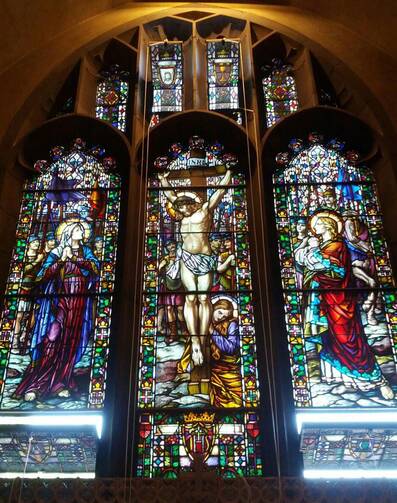Those of us who love Boston, those who were born there, those who live there, and especially those who were in Back Bay yesterday, are still taking in the appalling scenes from yesterday’s massacre. Not only on the most enjoyable day of the year in Boston, but also in the absolute heart of the town, Copley Square, on the most pleasant streets imaginable, on a beautiful New England day. Seeing blood in a familiar locale on such a hopeful day was almost impossible for the mind and heart to understand.
Seeing Boston damaged was like seeing a relative hurt. To be sure, I am a proud New England Province Jesuit, having done my novitiate and theology training in the city. My first spiritual director used to say that he was a Bostonian “by birth and by choice,” and I know many friends who would echo that sentiment, so deep is their love for Boston. Seeing injury come to the city was shocking, difficult to comprehend in such a familiar setting—the Jesuit community in Back Bay, on Newbury Street, is only a block away from site of the bombings. It was the same here in New York on September 11, 2001. Familiar surroundings, laden with happy memories, suddenly became places of immense sadness.
When Jesus was crucified his friends and family--the Gospels describe not only his mother but also his aunt at the crucifixion--must have had similarly overwhelming emotions. Seeing Jesus beaten, bloodied and finally nailed to the cross must have seemed unbelievable. How can this be? Just the week before, on Palm Sunday, Jesus was moving through the great city in triumph, as people clapped and cheered him on. I imagine that some of those who lost loved ones, and saw loved ones injured, felt something of the same yesterday in Boston. Joy and celebration quickly gave way to shock and sadness. Perhaps they had just clapped their hands for a friend, or waved on a husband or a wife, or cheered on a neighbor or a work colleague, who had been training for months, as they saw them run across the finish line in triumph. As in Jesus's time, friends and family members entered the great city prepared for joy, not agony.
But agony is what they received. Jesus received agony as well: beatings, torture, and bloody wounds gotten from the hands of the Roman soldiers. In the original Greek the Gospels do not stint in describing his pain on the cross. When he is on the cross he “screams out” and tells God he feels abandoned, shouting so loudly that people who had previously taunted him take pity on him. Before he dies he screams out one more time. We are not told what he said. One Bible commentary said that it was simply the cry of someone in terrible pain. Those watching felt an unfathomable sadness and horror and helplessness.
In this Easter season, Boston is now back in Good Friday. And one insight of that terrible day is that we do not have a God who does not understand suffering. Everyone on that first Good Friday in Jerusalem knew suffering: Jesus’s disciples, who had expected a joyful victory but received a miserable failure; and his family and friends who had followed him to the great city in happiness, but were met with sadness. Like the people in Boston, who had prepared for joy, they must have been at a loss to take in all the misery. Here was the person we loved, the one we knew well, for whom we had such hopes, cut down. In this familiar setting that is such a part of our lives—Jerusalem, Boston--violence, maiming and death. It doesn’t make sense. Finally, Jesus himself—God on the Cross—was miserably treated. A victim of senseless violence as sure as those on Boylston Street were.
Why bring this up? Because Jesus is not someone who does not understand pain. Jesus is with us in our suffering, not only because he loves us but because he suffered.
But suffering is never the last word. There is always the possibility of new life. How will this happen? It may be difficult to see now, as it was impossible for the disciples on Good Friday to see, but the God who has suffered is ready to help us, and always holding out the promise of something new, something that will help us move beyond the blood and tears.
That was true in Jerusalem 2,000 years ago and it is true in Boston today.








